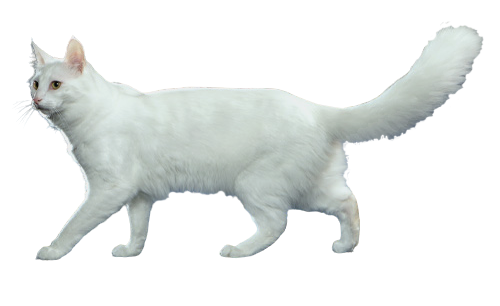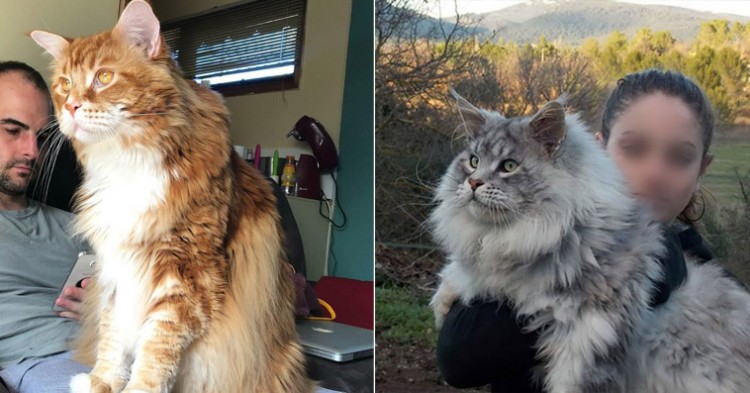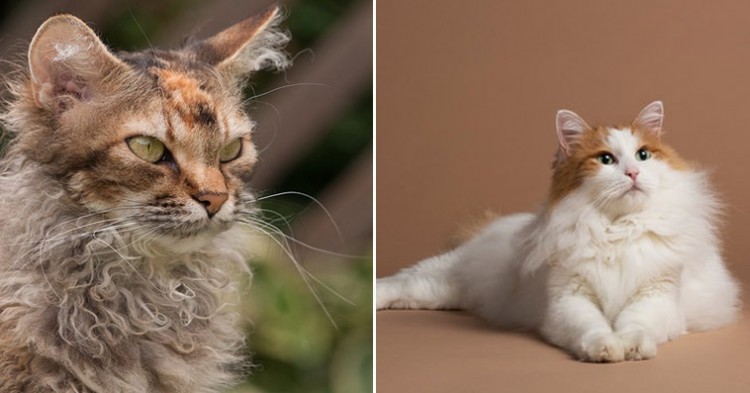
Turkish Angora
USD $1000 - $2000 Price Avg.
Small, Medium
Size
No
Lap Cat
15 to 18 years
Lifespan
Breed Information
| Popularity/Rank | 34 |
|---|---|
| Name | Turkish Angora |
| Other names | Ankara |
| Origin | Turkey |
| Size | Small, Medium |
| Coat | Silky, Sleek, Soft, Long Hair |
| Lap Cat | No |
| Lifespan | 15 to 18 years |
| Temperament |
Agile, Clever, Gentle, Intelligent, Playful, Social, Affectionate Agile: The Turkish Angora is an agile cat breed that is known for its athleticism and grace. These cats are very quick and agile, making them excellent climbers and jumpers. They are also known for their intelligence and cleverness, which makes them great at problem-solving. Turkish Angoras are gentle cats that enjoy being around people and other animals. They are also very playful, often engaging in games of fetch or chasing toys. Turkish Angoras are social creatures that enjoy being around others, including both humans and other animals. They are affectionate cats that enjoy being petted and cuddled. |
| Weight | Female: 6 - 9 pounds, Male: 8 - 12 pounds |
| Colors | Black, Blue, Cream, Red, White |
| Kitten Prices |
USD $1000 - $2000
Turkish Angora kittens are some of the most beautiful and sought-after cats in the world. They are known for their long, silky fur, which can be either white or a variety of other colors. Turkish Angoras are also very intelligent and playful cats, making them excellent companions. The price of a Turkish Angora kitten can vary greatly depending on the breeder and the kitten's parents. Some breeders may charge as much as $2000 for a single kitten, while others may only charge $1000. The reputation of the breeder and the quality of the kitten's parents will also affect the price. Choosing a Turkish Angora kitten can be a difficult decision, but it is important to remember that price is not always an indicator of quality. Some of the best Turkish Angoras come from small, unknown breeders who may not charge as much as some of the more well-known breeders. It is important to do your research and find a reputable breeder who you feel comfortable with before making your purchase. |
Breed Characteristics
| Adaptability | |
|---|---|
| Affection Level | |
| Child Friendly | |
| Dog Friendly | |
| Energy Level | |
| Grooming | |
| Health Issues |
Feline infectious peritonitis, Feline leukemia, Feline immunodeficiency virus, Cystitis, Gastritis Is Turkish Angora cat Hypoallergenic? There is no definitive answer to this question as everyone's allergies are different. Some people may find that they are allergic to Turkish Angora cats while others may not. The best way to determine if you are allergic to a particular cat is to spend time around it and see if you have any reaction. 1. Feline infectious peritonitis Feline infectious peritonitis (FIP) is a viral disease that affects cats. The disease is caused by a virus in the feline coronavirus family. FIP is a serious disease that can be fatal in cats. 2. Feline leukemia Feline leukemia is a viral disease that affects cats. The disease is caused by a virus in the feline leukemia virus family. Feline leukemia is a serious disease that can be fatal in cats. 3. Feline immunodeficiency virus Feline immunodeficiency virus (FIV) is a viral disease that affects cats. The disease is caused by a virus in the feline immunodeficiency virus family. FIV is a serious disease that can be fatal in cats. 4. Cystitis Cystitis is a condition that affects the bladder. The condition is caused by an inflammation of the bladder. Cystitis can be a serious condition that can be fatal in cats. 5. Gastritis Gastritis is a condition that affects the stomach. The condition is caused by an inflammation of the stomach. Gastritis can be a serious condition that can be fatal in cats. |
| Intelligence | |
| Shedding | |
| Social Needs | |
| Stranger Friendly | |
| Vocalization | |
| Health Care |
The Turkish Angora is a beautiful, elegant cat with a long, silky coat. They are also one of the healthiest cat breeds, with very few health problems. However, they do require some special care to keep them healthy and looking their best.
Here are some tips for caring for your Turkish Angora: 1. Brush their coat regularly to prevent tangles and mats. 2. Give them regular baths to keep their coat clean and free of debris. 3. Trim their nails regularly to prevent overgrowth. 4. Check their ears regularly for wax buildup or other problems. 5. Feed them a high-quality diet to maintain their health. By following these simple tips, you can help keep your Turkish Angora healthy and looking beautiful. |
History
The Turkish Angora is a beautiful, elegant cat with a long, silky coat. It is one of the oldest natural breeds of cats, and its history goes back centuries. The Turkish Angora is believed to be the ancestor of all long-haired cats, and it is thought to have originated in the mountainous regions of Turkey.
The Turkish Angora breed almost became extinct in the early 1900s due to cross-breeding with other short-haired breeds. However, a few dedicated breeders kept the bloodline alive, and eventually the breed became popular again. Today, Turkish Angoras are still relatively rare, but they are cherished by those who own them.
The ancestry of the Turkish Angora cat is uncertain, but it is thought to be related to the Persian cat. The first documented mention of the Turkish Angora was in 16th century Turkey, where it was prized for its hunting ability and its beautiful coat. In 1868, two Turkish Angoras were brought to France as gifts for Napoleon III's wife Empress Eugenie. These cats quickly became popular in Europe, and eventually made their way to America in the early 1900s.
The Turkish Angora was recognized as a distinct breed by The International Cat Association (TICA) in 1979. Today, they are still relatively rare compared to other cat breeds, but their popularity is slowly growing. Thanks to their loving nature and beautiful appearance, these cats make wonderful companions and are sure to bring joy into any home.
Description
The Turkish Angora is a beautiful, elegant cat with a long, slender body and a silky, fluffy coat. They are one of the oldest natural breeds of cats, and their origins are thought to date back to the city of Ankara in Turkey. Turkish Angoras are known for their intelligence, playful personality, and affectionate nature. They are also relatively easy to train and can be taught tricks and behaviors such as fetching and walking on a leash.
Turkish Angoras come in a wide variety of colors, including white, black, blue, red, cream, and tortoiseshell. They typically weigh between 8 and 12 pounds and have a lifespan of 12-15 years. Turkish Angoras are generally healthy cats with no major health concerns; however, they are prone to developing ear infections due to their long ear tufts.
Turkish Angoras make great pets for families with children or other pets; they are social creatures who enjoy being around people and other animals. They do require some grooming due to their long coats, but regular brushing will help keep their fur from matting. Overall, Turkish Angoras are active, playful cats who make loving companions.
Turkish Angora Posts
Explore Turkish Angora's photos, videos, activities, stories, and facts.





